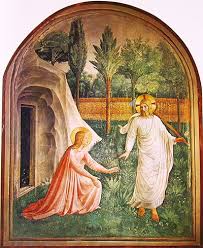has retreated to a monastery
where he has submitted himself
out of exhaustion to not knowing.
He’s been thinking about
the incarnation a.k.a. Big Bang
after hearing a monk’s teaching
that crucifixion was not the hard part
for Christ. Incarnation was.
How to squeeze all of that
all-of-that into a body. I woke
that Easter to think of the Yaqui
celebrations taking place in our city
the culminating ritual of the Gloria
when the disruptive spirits
with their clacking daggers and swords
are repelled from the sanctuary
by women and children
throwing cottonwood leaves and confetti
and then my mother rose
in me rose from the anguish
of her hospice bed a woman
who expected to direct all the action
complaining to her nurse
I’ve been here three days
and I’m not dead yet—not ready
at one hundred and two to give up
control even to giving up control.
I helped with the morphine clicker.
Peace peace peace the stilling
at her throat the hazel eye
become a glassy marble. Yet here she is
an Easter irreverent still rising
to dress in loud pastels
and turn me loose
in Connecticut woods to hunt
my basket of marshmallow eggs
jelly beans and chocolate rabbit
there fakeries of nature made vestal
incarnated in their nest of shiny manufactured grass.
where he has submitted himself
out of exhaustion to not knowing.
He’s been thinking about
the incarnation a.k.a. Big Bang
after hearing a monk’s teaching
that crucifixion was not the hard part
for Christ. Incarnation was.
How to squeeze all of that
all-of-that into a body. I woke
that Easter to think of the Yaqui
celebrations taking place in our city
the culminating ritual of the Gloria
when the disruptive spirits
with their clacking daggers and swords
are repelled from the sanctuary
by women and children
throwing cottonwood leaves and confetti
and then my mother rose
in me rose from the anguish
of her hospice bed a woman
who expected to direct all the action
complaining to her nurse
I’ve been here three days
and I’m not dead yet—not ready
at one hundred and two to give up
control even to giving up control.
I helped with the morphine clicker.
Peace peace peace the stilling
at her throat the hazel eye
become a glassy marble. Yet here she is
an Easter irreverent still rising
to dress in loud pastels
and turn me loose
in Connecticut woods to hunt
my basket of marshmallow eggs
jelly beans and chocolate rabbit
there fakeries of nature made vestal
incarnated in their nest of shiny manufactured grass.
--Alison Hawthorne Deming (1945- ), American poet and essayist




















